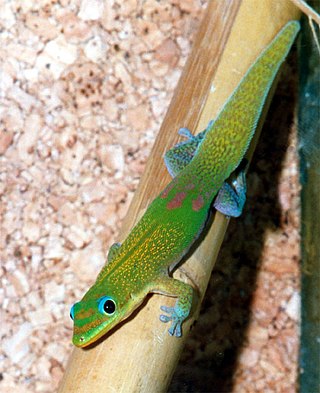
Geckos are small, mostly carnivorous lizards that have a wide distribution, found on every continent except Antarctica. Belonging to the infraorder Gekkota, geckos are found in warm climates throughout the world. They range from 1.6 to 60 centimetres.

Gekkonidae is the largest family of geckos, containing over 950 described species in 64 genera. The Gekkonidae contain many of the most widespread gecko species, including house geckos (Hemidactylus), the tokay gecko (Gekko), day geckos (Phelsuma), the mourning gecko (Lepidodactylus), and dtellas (Gehyra). Gekkonid geckos occur globally and are particularly diverse in tropical areas.

Gekko is a genus of Southeast Asian geckos, commonly known as true geckos or calling geckos, in the family Gekkonidae. Although species such as Gekko gecko are very widespread and common, some species in the same genus have a very small range and are considered rare or endangered.
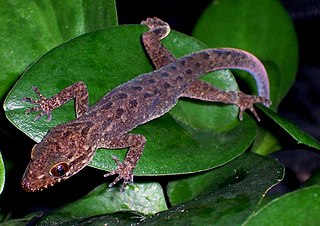
Cyrtodactylus is a diverse genus of Asian geckos, commonly known as bent-toed geckos, bow-fingered geckos, and forest geckos. The genus has 354 described species as of 2023, which makes it the largest of all gecko genera.

Ptychozoon was a genus of arboreal geckos, endemic to Southeast Asia, known commonly as flying geckos, gliding geckos, or parachute geckos. They all are now placed in the genus Gekko in the family Gekkonidae. The biogeographic history of the genus Ptychozoon was deeply nested within that of the genus Gekko, the center of diversity of which is within Southeast Asia. Since dispersing into Southeast Asian rainforests, Pytochozoon, like other forest-dwelling vertebrates, adapted to facilitate gliding. All species in the genus Ptychozoon are characterized by cryptic coloration and elaborate webs surrounding the neck, limbs, trunk, and tail. These membranes help to conceal the gecko against trees. When the gecko leaps into the air, the flaps are used to generate lift and allow the gecko to control its fall. It can glide up to 200 feet. Also it does a swoop at the end of its glide to land softly. A similar adaptation is found in geckos of the genus Cosymbotus. There were thirteen described species in the genus Ptychozoon.

The golden gecko, also known commonly as Baden's Pacific gecko, is a species of lizard in the family Gekkonidae. The species is native to Vietnam.

Gekko smithii, commonly known as Smith's green-eyed gecko or the large forest gecko, is a species of lizard in the family Gekkonidae. The species is native to mainland Southeast Asia and Indonesia.

The Andaman giant gecko, also known commonly as the Andamanese giant gecko, is a species of lizard in the family Gekkonidae. The species is indigenous to the Andaman Islands

The flat-tailed house gecko, also known as the frilled house gecko or Asian house gecko, is a species of Gekkonidae native to southeastern and southern Asia. The species is sometimes classified under the genus Cosymbotus.

Gekko kuhli, commonly known as Kuhl's flying gecko, Kuhl's parachute gecko, or the gliding gecko, is a species of lizard in the family Gekkonidae. The species is found in Southeast Asia.

Gekko lionotum, commonly known as smooth-backed gliding gecko or Burmese flying gecko, is a species of gecko found in Southeast Asia.
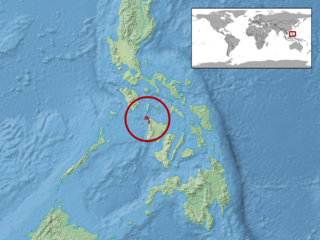
Gekko ernstkelleri is a species of gecko, a lizard in the family Gekkonidae. The species is endemic to the Philippines.
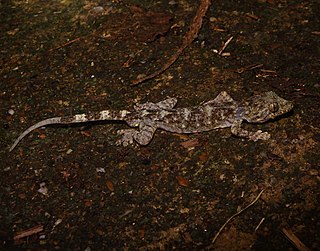
Adler's gecko is a species of lizard in the family Gekkonidae. The species is native to southern China and northern Vietnam.

Lauhachinda's cave gecko is an endangered species of lizard in the family Gekkonidae. The species is endemic to Thailand.
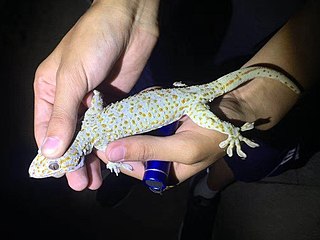
Reeves's tokay gecko is a species of lizard in the family Gekkonidae. The species is endemic to Asia.
The Siamese green-eyed gecko is a species of lizard in the family Gekkonidae. The species is endemic to Thailand.
Aaron Bauer's gecko is a species of lizard in the family Gekkonidae. The species is endemic to Laos.
Brooks's wolf gecko is a species of lizard in the family Gekkonidae. The species is endemic to Sumatra.
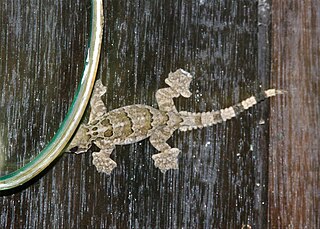
Gekko horsfieldii, also known commonly as Horsfield's flying gecko, Horsfield's gliding gecko, and Horsfield's parachute gecko, is a species of lizard in the family Gekkonidae. The species is endemic to Asia.















